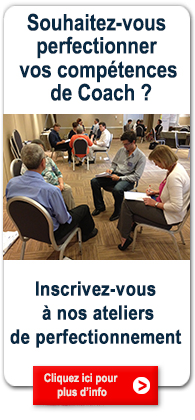Qu’est-ce que le Méta-Coaching ?
What is Meta Coaching?
The new phenomenon called ‘coaching’ means many different things to different people. Despite the fact that the field has been evolving for 20 years (1991, Leonard Thomas, U. trainer), there still isn’t one, clear, unique definition of what coaching is. And there are still many ‘services’ being provided under the coaching banner, but which have nothing to do with real coaching.
Despite this, most people in this field are unable to clearly distinguish coaching from other helping professions such as therapy, consulting and mentoring. Most people know that it is intended for people in good psychological health, and not for people with deep psychological trauma or dysfunction. Most also realise that it has something to do with new disciplines in psychology – cognitive, humanist, positive, developmental, strength-based psychology, psychology of memory, etc. Most also know that there is a link with challenge, stretching oneself, peak performance, meaning and significance, contribution, with the creation of legacy, with a leadership mindset, etc. All of this is good – very good.
So then, what is coaching? How would you describe it ti someone who does not know what it is? And how will you define Meta-Coaching? So imagine someone asking the real question: “Coaching? What do you mean by coaching?”
- Coaching allows you to evolve and reach your next level of development and performance;
- Coaching is stretching yourself out of your comfort zone, so that you may realise your full potential;
- Coaching is concentrating unwaveringly on what matters most to you in a crystal-clear manner;
- Coaching is about planning for grand objectives and creating plans to reach them;
- Coaching is a commitment to yourself to not put yourself down, but to delve in your inner potential which asks only to be released;
- Coaching is a promise to oneself to be the best one can be for one’s close ones and colleagues;
- Coaching is the ego strength to instigate a project which will change your world and that of man others.
How will you answer this questions? Which answer receives the most attention, the one that makes them want to ask you more? Which answer induces a state of inspiration and hope for what coaching can do for them and will prompt them to ask you to become their coach? This is your basic framing exercise. This has to do with how you frame coaching itself, the way you categorise it, and the main activities you include in that category. And since, as a meta-coach, you know that he who sets the frame controls the game – how will you frame things for those you will meet? There is, however, a definition of Meta Coaching in the Meta-Coaching Training Manual. It’s one of the questions used for ‘The Test’ on the 8th day (as you well know!) that people find very hard to answer. Yesterday I wrote an article on the ‘science of coaching for the ICF, in Taiwan. They asked me to help them promote Meta-Coaching in Taiwan, so I updated the definition so it was in line with what Meta-Coaching has become and that upon which we are concentrating. So here is the updated definition, now in the manual:
Coaching is the art of facilitating, an individual or an organisation towards a precise goal, through a ruthlessly compassionate conversation, which goes to the heart of the client’s meaning, identifies and mobilises inner and external resources, to establish, free and actualise the client’s potential to reach his dreams
Meta-Coaching is a pioneering coaching methodology, which exceeds traditional Performance Coaching leading both the client and the coaching to higher levels. At these levels, it is natural and easy to generate profound change. Develop your ability to model the transformations you desire.
Meta-Coaching is based on the Cognitive Sciences of NLP (Neuro-Linguistic Programing) and Neuro-Semantics, as well as on the Self-Actualisation Psychology of Maslow and Rogers. It integrates these models in an advanced approach to coaching.
- Facilitating, not consulting, teaching, therapy, counseling, mentoring. A facilitation model;
- Individual and group coaching;
- Use the Well Formed Outcome process to generate a KPI: Key Performance Indicator used for benchmarking;
- An intimate and open relationship fostered through care (love even) and tenacity (confrontation);
- The frame (interpretation, mental model, significance) is always the real problem, not the experiences and emotions;
- People aren’t broken but have the potential resources to be at their best, and actualise their highest and best levels;
- The pursuit of self-actualisation within clients evolving to become fully alive/fully human and performant according to what has the highest meaning for them. That’s a lot. And as such, it points to the wealth of what you, as licensed Meta-Coaches, can do. And it is centred – it does not present coaching as simply a pleasant conversation, a one-size-fits-all, or just a positive way of thinking. It’s a way of becoming more than what you are, it’s a way of becoming authentically human like someone who reaches their best.
Meta-Coaching is very detailed and complete. It distinguishes itself from other training methods, as it integrated 7 core skills, that you will be able to use systematically with your clients. During the training, we concentrate on you as a coach, on your coaching tools to create a solid professional competence, and on your business so that you are able to create a commercially viable coaching business.
These 7 core skills are each specifically assessed thanks to a very precise benchmarking system. As such, listening, support, questioning, Meta-questioning, giving feedback, receiving feedback and state induction are individually graded during coaching sessions. A specific level is required to obtain certification.




